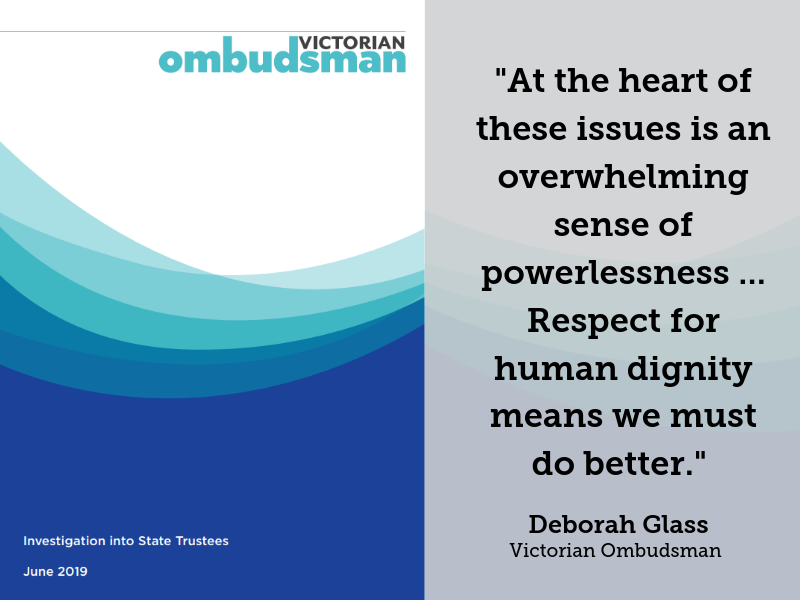
Published on Friday 05, July 2019
Victorian Ombudsman Investigation into State Trustees
IMCL welcomes the Victorian Ombudsman’s Investigation into State Trustees report and its recognition of the concerns raised in our submission arising from the experiences of our clients.
The report recognises the State Trustees’ failure to act in the best interests of clients affected by complex mental health and disability issues and provides a number of recommendations directed at achieving systemic change.
IMCL is pleased that in response to the investigation, State Trustees has already begun to implement changes to improve the experience of its clients, who make up some of the most vulnerable people in Victoria’s community.
Why was IMCL involved?
Our interest in achieving change to State Trustees stems from the work we do in providing legal assistance to people experiencing disadvantage in the inner-city area.
One of IMCL’s key partnerships is with Elizabeth Street Common Ground (ESCG), which provides housing and co-ordinated support for people who have experienced long-term homelessness.
We regularly help residents of ESCG, like Lionel, navigate the legal system and exercise rights in relation to a variety of legal issues, including administration orders.

Through working closely with social workers at ESCG, we were made aware of a range of issues that they and their clients had been experiencing with State Trustees. As a result, IMCL lodged a formal complaint with the Victorian Ombudsman in January 2018.
We thank the Ombudsman for investigating those individual complaints and for inviting IMCL to make a submission to its consequent investigation of State Trustees.
The Investigation into State Trustees
We raised concerns that State Trustees had not acted in the best interests of their clients in relation to: its communication with clients in order to support them to administer their own estate and take their wishes into account; helping clients apply for hardship or waiver provisions when paying bills and infringements; and the re-assessment of administration orders at VCAT.
IMCL is pleased that these important concerns have been recognised in the Ombudsman’s report, which identifies financial management and communication with clients as key areas where the State Trustees have failed to act in its clients’ interests.
The Ombudsman also recognised the significance of our clients’ experiences by directly referring to the stories of Alex, Warwick, and Adam in the report*:
Alex has an acquired brain injury and lives in supported housing for those who have experienced long-term homeless. He became discouraged when State Trustees refused to speak with him directly and only wanted to hear from his caseworkers before approving requests to release money. Since the Ombudsman raised Alex’s concerns, State Trustees is now consulting directly with Alex.
Warwick lives in supported housing and has schizophrenia. State Trustees had been providing Warwick with confusing and conflicting information, resulting in him overspending by almost $10,000 in 2017-18 and State Trustees withdrawing over $60,000 from his superannuation. Warwick was not informed of this, nor did his accounts clearly show this information.
Adam lives in supported housing and has schizophrenia. Whilst acutely unwell, he informed State Trustees that he was leaving Victoria. A consultant cancelled his rental payments without notifying his support workers despite there being a note on his file to do so. Adam didn't intend to relinquish his tenancy but the cancellation of his rental payments lead to termination of his Centrelink rent assistance and rental arrears, putting him at risk of eviction and homelessness.
Significantly, the investigation was able to identify some of the causes of these common problems, paving the way for effective recommendations to achieve real change.
The case management system used by the State Trustees means that clients deal with teams of employees rather than an individual, leading to a more ‘transactional’ service where a lack of continuity results in problems slipping through the cracks.
Substantial backlogs, increased staff turnover, cost shifting, and commercial pressures have also contributed to the substandard quality of service.
Furthermore, without a Disability Action Plan or human rights training provided to employees, the report found that State Trustees have neglected human rights in providing services.
Outcomes
As a result of the investigation’s review of 30 cases, State Trustees paid or reimbursed around $65,000 to 13 clients, provided an apology to 11 clients and agreed to meet or consult with five clients.
State Trustees has also indicated its willingness to improve its services by implementing broader amendments. It is developing an alternative case management model with a stronger client focus, arranging staff training around debts and infringements, amending procedures to make it clear when employees must consult clients, making some information more accessible for clients and introduced a Disability Action Plan and human rights training.
Further recommendations made by the Victorian Ombudsman around funding, disability expertise, engagement, accessible communication, support for client independence, accountability and transparency will encourage systemic change. Systemic change is vital to ensure that State Trustees is meeting its obligations to give effect to the will and preference of clients, support clients in decision making, and act as an advocate for clients.
IMCL thanks the Victorian Ombudsman for carrying out this important investigation into State Trustees and we look forward to witnessing first-hand the impact of its findings on the daily lives of our clients.
* Clients names have been changed for de-identification